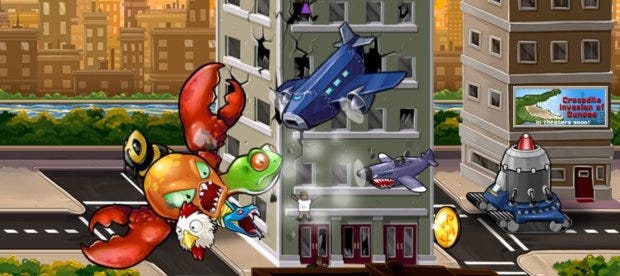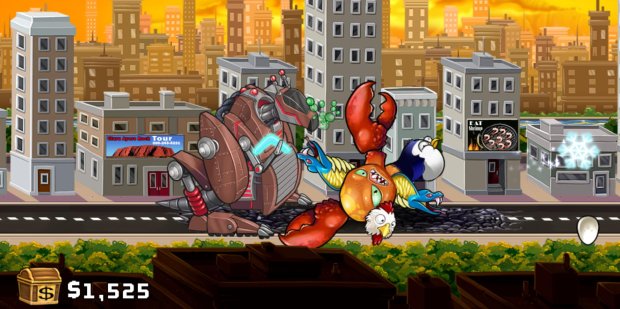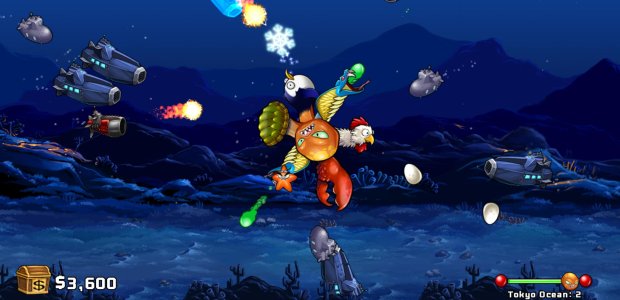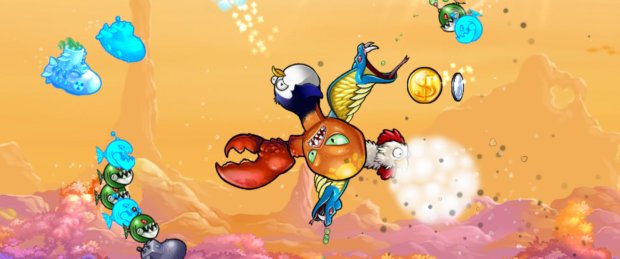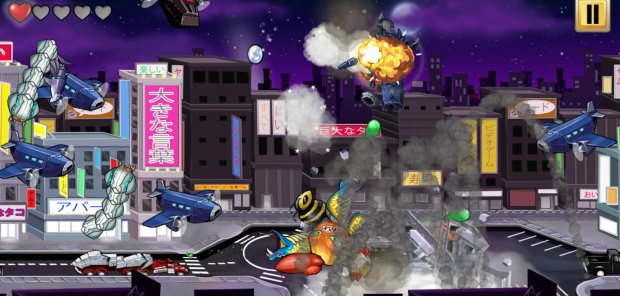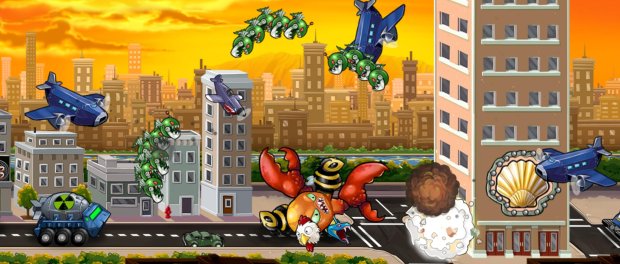Wot I Think: Octogeddon
Squids in
The creator of Plants Vs Zombies returns after nine years with Octogeddon - an arcade-inspired game of cephalopodic mayhem. One angry octopus takes on the world in his vengeful quest to destroy all that humans hold dear: large tourist attractions. Here's wot I think.
The Bristol Aquarium recently got itself a new octopus. Luna, a beautiful giant Pacific octopus, arrived last summer, and is worth the ticket price on her own. Unlike the previous inhabitant of the enormous cylindrical tank, she's bold and daft and seemingly not shy at all. On my most recent visit I was treated to the most extraordinary display of the suckers on her tentacles, as she splayed them across the glass at eye level such that they could be inspected in extraordinary detail.
Chatting with one of the aquarium staff who looks after her, I was told that octopuses kept in captivity like this will pick a member of staff they most like, and demonstrate their fondness for this individual through play. And of course Luna is quickly learning all sorts of extraordinary tricks, such as the ability to open jars, and skill with puzzle solving.
In other news, octopuses are available to eat on restaurant menus. Which is surely crazy? They are undoubtedly as intelligent as dolphins and elephants. These are not some dumb fish. Which, as it happens, is the opening premise of Octogeddon.
You play as a seemingly unnamed octopus - let's call him Octo - who on browsing an underwater version of YouTube happens upon a video of a chef preparing octopus sushi. Which doesn't seem to please him a great deal. It, in fact, is apparently all the prompting Octo needs to set about wreaking his revenge against all of humankind, starting with the destruction of the Statue Of Liberty.
This is the new game from the team fronted by the man who thought up Plants Vs Zombies, George Fan, which is perhaps the only reason anyone's taking any notice of the 287th cartoony game with an octopus in it released since yesterday. But good, because that's the right reason to take some notice. And while at first you'd be hard-pushed to find a similarity beyond its 2D cartoon style, the more you play, the more you can see the same mind at work.
At first it's a very simple arcade game. You spin a two-legged octopus on the spot, in order to line his tentacles up with incoming enemies. This wiggles the baddies to bits. But as you progress, you gain coins, and coins can be spent not just on new tentacles, but also new - er - DNA, to grow different appendages with unique skills. For instance, getting some snake DNA will afford you the ability to spit goop from that tentacle. Um. Or some chicken DNA will let you fire off exploding eggs. You know, like in nature documentaries. The further you progress, the more tentacles you can buy, and the more ridiculous abilities you can add, until you're an absolutely bonkers creature launching all manner of projectiles, snapping with lobster claws, and picking up enemies and whacking them into each other with a frog's tongue.
Each stage is split into two halves. Three levels are in the water, with Octo spinning in the middle of the screen as enemies attack from all angles. The second three are set on the land, Octo rolling along the city streets on his way to destroying a famous landmark. In these sections, only tentacles not currently squished underneath him can do their jobs, as he rolls to the left or right to make progress. And what becomes quickly apparent as you play either is the choice of limbs you've made, and the order in which you've arranged them, greatly affects how you play a level.
Enemies attack in constant waves, albeit from all angles here, and you have to constantly position Octo to respond appropriately. If you've got a viper spitting venom on one tentacle, you'll need that aimed toward rapidly approaching planes or ships, but at the same time there are the three encroaching subs that require a chicken egg lobbed their way to stop them getting any closer. But now there's an explosive radiated vehicle making threats, and blowing that up will take out those two enemy planes too, so you want to have the bee-based homing missiles get them, except now that rocket launcher is really close so get the lobster claw chomping at it...
It's here that you start to see the loose connection between Octogeddon and PvZ. While both games play very dissimilarly, it's in the selection from an ever-growing pool of resources, in order to deal with ongoing onslaughts of attacks, that they align.
Between each level you can spend accumulated coins to buy new tentacles, or new abilities, or even new lives. But when it comes to abilities, it randomly selects three (at first) from your pool each time, meaning you might not have access to the snail shield you really want exactly when you want it - thus you must make do and mend, adding a lot more variety and preventing you from opting for the same setup time and again.
It is in death, however, that you can make more major changes. Octogeddon is an arcade game first, and this is about seeing how far through you can progress each time, starting all the way back as a two-tentacled basic Octo after you've lost all your lives. But before you do, any shells you've gathered on your attempt can be spent in the between-game store, letting you add new DNAs to the pool, increase your number of starting hearts per life, and even bump up the number of lives you'll begin with. It's also here that you can increase the number of DNA slots available for the random picks. Plus, reach later stages and shortcuts can be purchased to skip chunks of early sections. Of course, this comes with the cost of also losing out on all those levels' coins, and thus a slightly weaker Octo.
Starting from the beginning each time, albeit an increasingly tweaked beginning, is quite the setback. Of course, on further attempts with your larger pool of DNA, there's access to more advanced attacks from the start. The game counters this by also bringing in the tougher enemies you've met later on into those earlier stages. This keeps it more interesting, although there certainly is still an element of fatigue at having to re-do already very repetitive levels you've already played a whole bunch of times. That is my largest concern about Octogeddon, and yet even as I think, "Can I really be bothered to do the Statue Of Liberty boss all over again?" I find myself already trying.
And as it happens, the more you play, the better you make the earlier stages for yourself. First couple of times you'll be firing snake venom and snapping crab claws, because that's what they're is, and it's fairly elementary. But once the DNA pool gets bigger, and the options it might throw up pricier, you can find yourself limited to trying to get through with a three-armed Octo brandishing only a single slow-firing chicken. And that makes for a very different play.
Sadly the enemy design offers no such delights as you might expect from Mr PvZ. They're easily recognisable, but they're planes and tanks and sharks and submarines. There's no humour in them. The tentacle additions are all brilliant, but the enemies, while multifarious and nefarious, are a missed opportunity for more gags.
And goodness me, for what possible reason are there no options to play with a controller? You can turn Octo using keys, or as the game prefers, your left and right mouse buttons. But that involves having the ugly Windows cursor on the screen all the time, an unwelcome distraction when you're already trying to track 14 other enemies at once. The invisible controls of an analogue stick make by far the most sense here, and is the only option missing.
Octogeddon is, without a doubt, not the sure-fire hit that Plants Vs Zombies once was, before EA sank their vampiric teeth deep into its neck and drank all its hope. But what it is, is a surprisingly complex arcade game, that belies its depth behind an immediately simple premise. By far its cleverest feature is the one it necessarily hides the most: that the more you play it, the better a game it becomes. That's a risky move, and one that deserves celebration, as you realise that what was once the simple, introductory level 1 can soon become an opportunity for experimentation and improvisation.
Its determination to prevent the player from just looping the same tactics every time works splendidly, meaning I've put together tentacle combinations I'd never have stumbled upon if I'd relied on what had almost worked before. And it absolutely perfectly draws you in for that Just One More Go, looping your desire to try again with its constant dripping of new elements, all of which could have been gruesomely monetised, none of which have been. As you dig into it, you once again find the mind of George Fan at work.
I fear that the necessity to dig will mean this game struggles to find the same traction, especially when it doesn't have PvZ's enormous advantage of providing a simple entry point to the prevailing genre trend of its time, then tower defence. Octogeddon instead refers back to the arcade cabinets of the '80s, both in the simplicity of its opening premise, and in much of the presentation. But it is its own unique idea, that while not world-changing or particularly revolutionary, is quietly brilliant in its delivery. I only worry that it's slightly too quiet.
Octogeddon is out 8th Feb for Windows via Steam.
